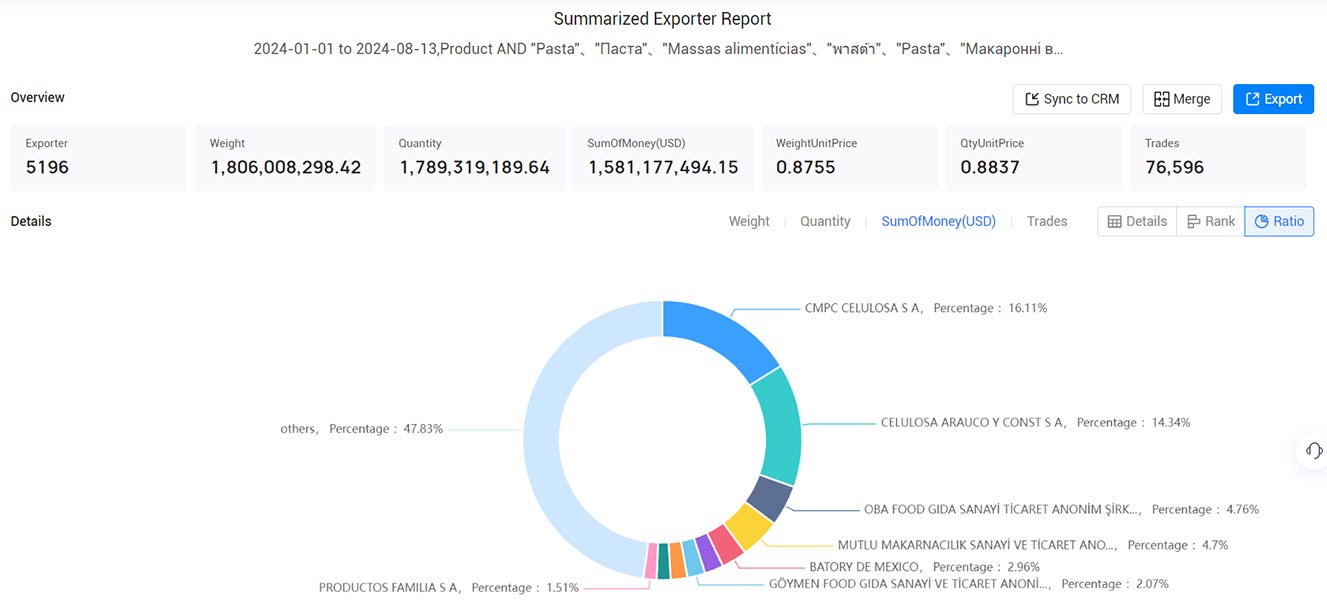 Market Insights
Market Insights
 2024-08-13
2024-08-13
In 2022, global pasta exports reached a significant total of US$14 billion. This figure marks a substantial 38.1% increase compared to the $10.1 billion recorded five years earlier in 2018. Year-over-year, the value of pasta exports saw a 9.1% rise from $12.8 billion in 2021.
This report covers both fresh and dried pasta varieties. In Italian cuisine, these types of pasta are utilized in three main categories of dishes: cooked pasta served with sauces or condiments, pasta incorporated into soups, and pasta used in baked dishes.
The top five pasta-exporting countries are Italy, China, South Korea, Türkiye, and Thailand. Together, these countries accounted for more than half (57.1%) of the global pasta export market by value in 2022.
On a continental scale, Europe led the way in pasta exports with shipments valued at $7.3 billion, representing 52.3% of the global total. Asia followed with 39.2%, while North America contributed 4.6% to the global pasta trade. Smaller portions came from Africa (2.4%), Latin America (1.3%, excluding Mexico but including the Caribbean), and Oceania (0.2%), with New Zealand, Fiji, and Australia as key players.
For those conducting research, the relevant Harmonized Tariff System code for pasta is 1902, which includes both cooked and uncooked varieties. Also, World Pasta Day is celebrated annually on October 25th.

Top Pasta Exporting Countries in 2022
Here are the 15 countries that led the world in pasta exports by value in 2022:
1. Italy: $4.2 billion (29.9% of global pasta exports)
2. China: $1.2 billion (8.6%)
3. South Korea: $978.4 million (7%)
4. Türkiye: $964.5 million (6.9%)
5. Thailand: $663.3 million (4.7%)
6. United States: $439 million (3.1%)
7. Vietnam: $426.1 million (3%)
8. Belgium: $412.9 million (3%)
9. Germany: $385.4 million (2.8%)
10. Netherlands: $361.9 million (2.6%)
11. Indonesia: $346.8 million (2.5%)
12. France: $251.8 million (1.8%)
13. Spain: $247.4 million (1.8%)
14. Austria: $191.5 million (1.4%)
15. Poland: $180.1 million (1.3%)
These 15 countries collectively represented 80.3% of the world's pasta exports in 2022.
Among the leading exporters, Spain, Vietnam, Poland, and Türkiye saw the most significant growth since 2021, with increases of 26.2%, 25.7%, 24.2%, and 24.1%, respectively. Austria, however, experienced a notable decrease in pasta exports, with a decline of -31.8% from the previous year.
Prominent Pasta Exporting Companies in 2024
The following are some of the key players in the global pasta export industry:
1. CMPC Celulosa S.A. (16.11%)
2. Celulosa Arauco y Const S.A. (14.34%)
3. Oba Food Gida Sanayi Ticaret A.Ş. (4.76%)
4. Mutlu Makarnacılık Sanayi ve Ticaret A.Ş. (4.70%)
5. Batory de Mexico (2.96%)
6. Colombiana Kimberly Colpapel S.A.S. (2.18%)
7. Göymen Food Gida Sanayi ve Ticaret A.Ş. (2.07%)
8. Ecuador Kakao Processing Proecuakao S.A. (1.93%)
9. Nilons Enterprises Pvt. Ltd. (1.62%)
10. Productos Familia S.A. (1.51%)
These companies have established themselves as significant contributors to the international pasta market, driving the industry’s growth and maintaining their positions as top exporters.

What can Tendata customs data help enterprises with?
1. Market Analysis
- Market Trends Analysis: Tendata's customs data helps businesses analyze market trends, understand the import and export volumes and growth trends of specific products or industries, and monitor changes in various country markets. Based on Tendata's market analysis, businesses can more accurately select target markets, including considering markets with large import and export trade volumes, rapidly growing demand, and understanding information about potential trading and cooperation partners.
- Product Analysis: By gaining insight into the performance of different products in international markets, businesses can optimize product positioning. Tendata's customs data also provides information on competitors' import and export activities, helping to develop more competitive strategies.
- Competitor Analysis: Using Tendata, businesses can analyze competitors, staying updated on their trade dynamics, import and export prices, trade volumes, etc., enabling rapid adjustments to market strategies.
>> Learn More About Tendata <<

2. Customer Development
- Customer Profiles: Tendata's customs data provides access to customers' import and export records, helping businesses understand their purchasing behavior, including the types of products purchased, quantities, frequencies, etc. This assists in forming customer profiles, allowing businesses to better understand customer needs and preferences. By analyzing customers' trading partners, businesses can understand the supply chain networks in which customers operate, thus gaining insights into their business environment and potential cooperation opportunities.
- Customer Background Checks: Tendata's customs data includes customers' trade history and payment records, facilitating credit assessments. By understanding customers' payment credibility, businesses can prudently select partners, reducing transaction risks. Through customs data, businesses can check whether customers' trading activities comply with relevant regulations and compliance standards, ensuring that cooperation with customers is based on legal and regulatory compliance.
- Lead Generation: By analyzing Tendata's customs data, businesses can directly obtain customer contact information and proactively reach out to foreign trade customers via email, LinkedIn, phone, other social media platforms, etc., for direct marketing and lead generation!
>> Get a Free Demo Now <<

Category
Leave Message for Demo Request or Questions


 T-info
T-info T-discovery
T-discovery

 My
Tendata
My
Tendata Market Analysis
Market Analysis Customer
Development
Customer
Development Competitor
Monitoring
Competitor
Monitoring Customer Relationship
Customer Relationship





































































































































